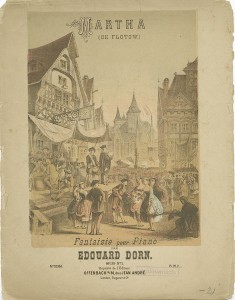You may have listened to “M’appri, tutt’amor” (“You appear to me, full of love”) as a popular Italian opera aria with a beautiful melody, such as that sung by Jussi Bjorling in his tender way: http://www.youtube.com/watch?v=pFnHkOX_bbQ&feature=related;
and Placido Domingo’s expressive yearning: http://www.youtube.com/watch?v=KU6F3_XMU_w&feature=related]
陈耀国译 Tr. YK Chan

The market at Richmond
M'appari.....tutt'amor,
你出現……….滿載愛情,
il mio sguardo.....l'incontro:
一瞥之下……..我們相会:
bella si.....che il mio cor,
多麼漂亮………..使我的心,
ansioso a lei volo:
要飛躍去靠近你:
mi feri, m'invaghi
我受創,燃心焰
quell'angelica belta,
天使般的艳丽,
sculta in cor dall'amor
把愛情刻進我的心
cancellarsi non potra:
不能擦掉它:
il pensier di poter
单是想着她
palpitar con lei d'amor,
就呼应我熱情的心跳,
puo sopir il martir
缓和我的遭难
che m'affana e stranzia il cor e stranzia il cor
却令我憂傷,令我心碎,令我心碎!
M'appari.....tutt'amor,
你出現……….滿載愛情,
il mio sguardo.....l'incontro:
一瞥之下……..我們相会:
bella si.....che il mio cor,
多麼漂亮………..使我的心,
ansioso a lei volo:
要飛躍去靠近你:
Marta, Marta, tu sparisti
瑪太,瑪太,你消失了,
e il mio cor col tuo n’ando!
我的心也跟你離去!
Tu la pace mi rapisti,
你偷掉了我心安,
di dolor io moriro.
我將憂伤而逝,
di dolor morro, ah, morro!
我就死去,阿,我將消逝!
This tenor aria actually is from a German opera “Martha 玛太” [See http://en.wikipedia.org/wiki/Martha_(opera)] by Friedrich von Flotow (1812-1883) with German libretto. The original German aria is “Ach, so fromm, ach so traut” (“Oh so sweet! Oh so true!” The romantic comic opera is based on a Scottish story of idealized love that crosses the class boundary between royalty and peasantry.
The German tenor , Fritz Wunderlich, sings it perfectly
[http://www.youtube.com/watch?v=LGuWTAzUfF0&feature=related]
Placido Domingo, who is very versatile, also sings the original version:
http://www.youtube.com/watch?v=KAW-R0K1U5Y&feature=related
Compare the Italian lyrics to the original German below. The English translation that follows is not mine.—YK
Ach! so fromm, ach so traut,
Hat mein Auge sie erschaut;
Ach! so mild, und so rein
Drang ihr Bild in’s Herz mir ein.
Banger Gram, eh’ sie kam,
Hat die Zukunft mir umhüllt,
Doch mit ihr blühte mir
Neues Dasein lusterfüllt.
Weh! Es schwand, was ich fand, ach!
Mein Glück erschaut ich kaum,
Bin erwacht und die Nacht
Raubte mir den süssen traum.
Ach! so fromm, ach so traut,
Hat mein Auge sie erschaut;
Ach! so mild, und so rein
Drang ihr Bild in’s Herz mir ein.
Martha! Martha!
Du entschwandest, und mein Glück
Nahmst Du mit Dir;
Gib mir wieder, was Du fandest,
Oder teile es mit mir.
Oh so sweet! Oh so true!
This is how my eyes saw you;
Oh so kind and so pure!
Of this my heart was very sure.
Before you came was only sorrow.
Worried gloom was my tomorrow.
Then with you life blossomed new,
Only joy with you I knew.
Alas! Alas! you did not stay,
My happiness it went away.
Sleepless nights do I endure,
My sweetest dream has gone for sure.
Oh so sweet! Oh so true!
This is how my eyes saw you;
Oh so kind and so pure!
Of this my heart was very sure.
Martha! Martha!
You went from me
And took my happiness with thee;
Bring back to me what once you brought,
Or send me just some word or thought.










